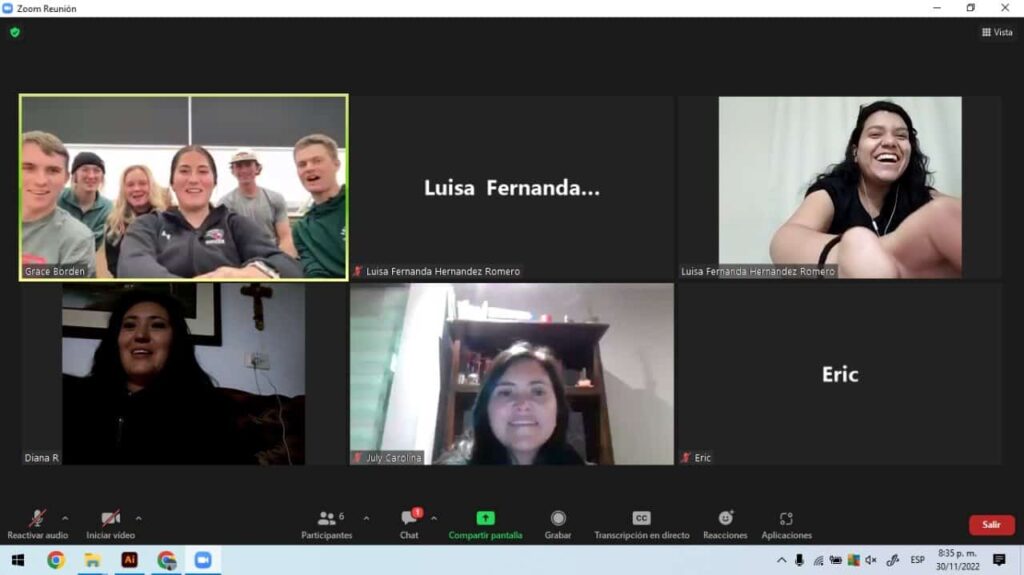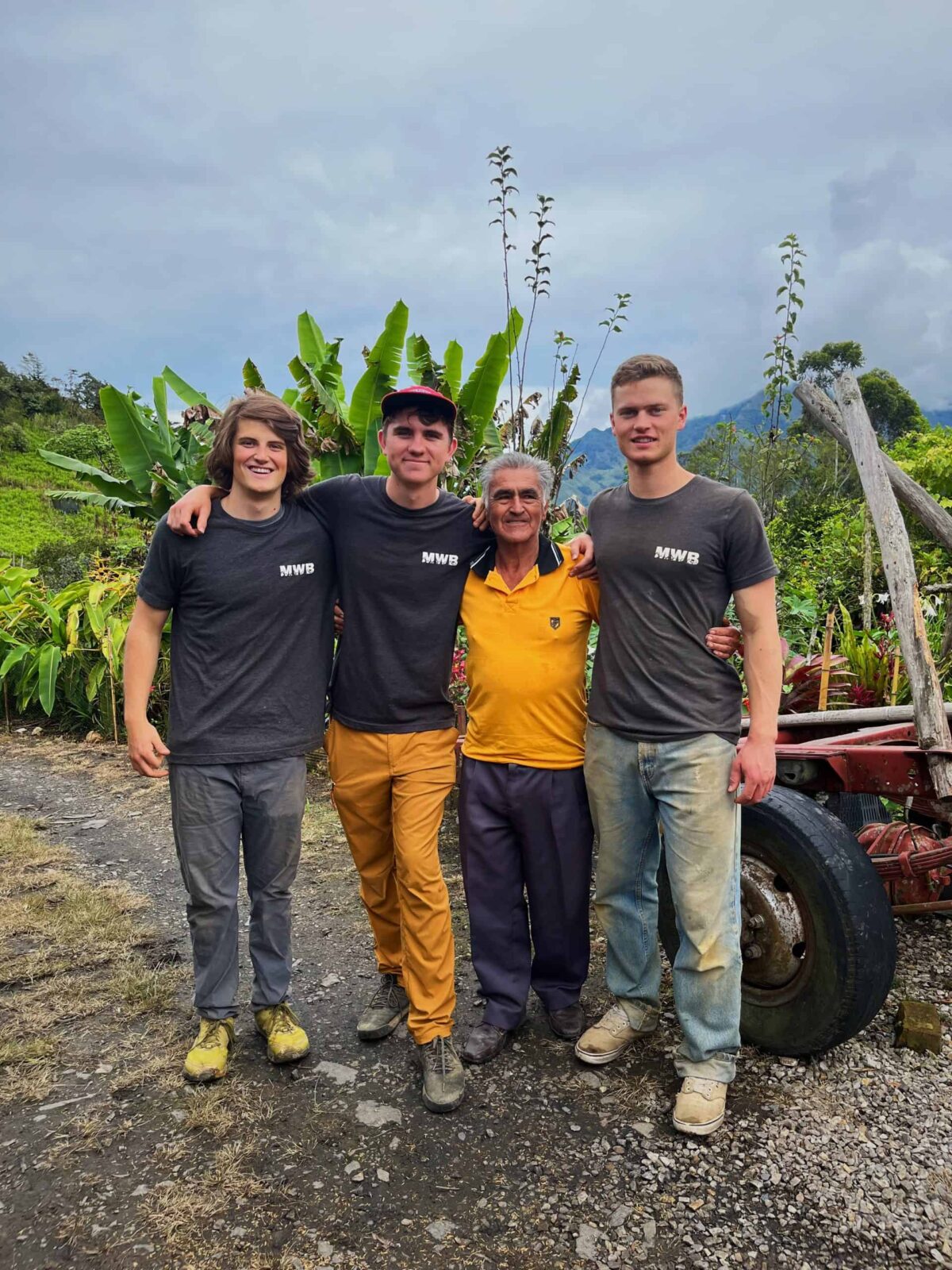
Most college students spend the week after finals partying, traveling, or vegging out in an attempt to recover after a period of high stress, minimal sleep, and a flurry of studying.
A small group of Western engineering faculty and students with the Mountaineers Without Borders (MWB) club, however, departed shortly after finals on a two-week trip to Colombia to implement a pair of engineering projects they had designed over the course of the academic year.
Through the Colombian organization Diversa, MWB was matched up with a farm in the small community of San Antonio Miraflores, in the department, or region, of Boyacá.
MWB students and faculty worked together to complete two projects: Constructing a mushroom substrate mixer — a device that efficiently produces a natural base material for mushrooms to grow from — and designing and building two mobile coops to house rabbits and chickens, aiding the local farmers in transporting them between plots.
Beginning back in the fall of 2022, MWB members began communicating directly with their stakeholders to determine project needs and shape their design parameters,

While MWB handled the coops, freshman students in the Rady School of Engineering and Computer Science handled the design process for the mushroom substrate mixer, developing plans that the club would later bring to fruition down in Colombia.
Once the spring semester started, MWB kicked into high gear, developing model drawings for the dual projects using 3D software, which they shared with stakeholders down in Colombia, who provided constructive feedback throughout the process.
Flash forward to April, and after refining those models on the computer, the club’s members used equipment in the Rady Building to construct working, half-size models as a proof of concept, and to make final design refinements.
Soon enough, finals week came and went, and Western said goodbye to another cohort of graduating students. Just a couple days later, the Mountaineers Without Borders team, which included seven freshman and sophomore students and four faculty, was on a plane flying down to Colombia.

Bogotá bound
When the group landed, they picked up supplies in Bogotá and traveled more than six hours by car on rural roads to the community of San Antonio Miraflores, their final destination.
There, they lived and worked on the farm for more than a week, engaging in a cross-cultural exchange and constructing the coops and substrate mixer.
“It was really cool to be living with the local community, living the same way they do,” relays Joshua Clyncke, the club’s president, of the holistic experience in Colombia.
Far beyond the walls of the newly built Rady Building, where Clyncke and his fellow engineering students are training to become the engineers of tomorrow, the young Mountaineers tested their building skills in a new environment.
“It was a little bit of on-the-ground problem solving, a little bit of woodworking, a lot of working with tools that we hadn’t ever used before, [and] a lot of quick changes,” says Clyncke. “But in the end, we put everything together.”

For Clyncke and other members of MWB, seeing a project through from design to completion in a rural setting came with a set of valuable lessons about practical implementation.
“As university engineers, we all wanted to design the biggest, fanciest, lightest, and strongest thing that we could,” explains Clyncke. “[But] we had a considerable amount of constraints on this project.”
The farmers needed the coops to be light and easy to use, allowing them to make the most efficient use of the labor they had on hand. But there were financial considerations as well, with the funding for project materials stemming largely from the local community.
Adaptationally, the MWB team needed to use materials that could be found readily throughout Colombia, in keeping with Diversa’s mission of sharing project plans in the hopes of replicating solutions across the country.
On the ground, that includes using older, less-than-ideal wood in the final build — a far cry from the shop-ready materials typically found inside the Rady School.
Finishing the project in San Antonio was an object lesson in “really understanding your customer, not just their needs and their wants, but their capabilities and limitations,” says Clyncke.
Altogether, the group left Colombia satisfied with the work they’d done, concluding the project by pushing their newly minted mobile coops up the top of a hill, demonstrating the viability of their creation.

The future of MWB
MWB’s international collaboration with the farm in San Antonio was made possible by their partnership with Diversa and the graciousness of the local farmers and project stakeholders, who provided housing for the Western cohort.
Also critical to the project’s success were funds contributed from the university’s Interclub Council (ICC) and from a SOURCE grant that sophomore Grace Borden, who serves as the club’s vice president, worked to obtain from the Western Research Council.
These various contributions funded the group’s prototypes, paid for Diversa’s project fees, and largely offset the cost for students to make the trek to Colombia for two weeks, which included four days of immersive travel in and around Bogotá.

Also making the club’s Latin American trek possible was Laurel Fisher, the assistant director of the CU-Western partnership, who handled much of the work powering the trip behind the scenes in administration and logistics.
The Rady School contributed equipment and funding, not to mention a dedicated group of faculty advisors, including Dr. Lauren Cooper, the club’s official advisor, who sadly was prevented from traveling to Colombia by injury.
Considering the group’s successful trip to Colombia — and the positive feedback from the local stakeholders — Clyncke’s eyeing another international project for Mountaineers Without Borders to take part in next year, which would likely involve forging new cross-cultural partnerships.
Moving forward, the president of MWB hopes that the group can become more involved in the greater Gunnison Valley next year, ideally working on a long-term project that could involve designing and building solutions to a housing, energy, trails, or farming problem.
“There’s [ample] project opportunities, and it would be cool to do something a little larger to give back to the valley,” concludes Clyncke.
You can follow along with Mountaineers Without Borders on Facebook, Instagram, and on their website. You can also email the club at MWBwestern@outlook.com



This project and programming was great for everyone involved. My daughter Amelie came back glowing and was extremely grateful to have been involved in this service project. She loved the hands on learning and creating and found great value in being immersed in the Colombian culture on the farm.